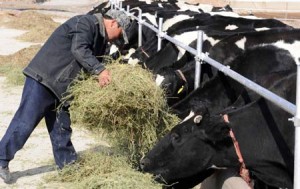Reuters | 9 November 2010

By Laura MacInnis
GENEVA, Nov 9 (Reuters) - Bankers and fund managers are scrambling to build up rural expertise in response to rocketing investor demand to buy entire farms as an inflation hedge.
Investment funds worldwide have put an estimated $15 billion to $20 billion in agriculture globally, and interest is also growing from ultra-rich investors and pension funds, which see farmland as tangible, strategic assets.
But Rich Gammill, managing director of the Cargill unit Black River Asset Management, which manages $6 billion including in food and agriculture, said farmland investments can be tricky.
"It seems simple, but agriculture is anything but. There is a global supply chain and lots of regulation, a lot of risks and factors that I think the traditional finance people on Wall Street do not have their heads wrapped around," he said.
Many investors also want international holdings, requiring their advisers to navigate different tax and regulatory systems, as well as rules on foreign land ownership.
"There aren't many Goldman Sachs bankers walking around rural China looking for dairy farms," Gammill said.
In the United States, the $1.2 trillion farming sector remains less than 1 percent institutionally owned, mainly because many investors don't know how to get started, said Mary McNairy, a partner at International Farming Corp, an alternative investment firm.
"It is huge. The question is, how do you get into it, how do you access the market," she said.
NEED FOR LOCAL CONTACTS
Gary Taylor, a partner with AgriCura, a fund focused on U.S. corn, soybean, cotton, rice and wheat farming, estimated that over the next decade 50 percent of U.S. farmland will change hands, mainly because of the advanced age of most farmers.
Buying agricultural lands requires local links, said Tim Hornibrook, division director of Macquarie Agricultural Funds Management.
"It is essentially a private market. That makes it hard to get access but it also presents great opportunity," he said.
Several investment managers also described the struggle to bridge the gap "between Wall Street and the farm track", with a search for farm managers who can deal well with investors and bankers who understand the basics of agricultural operations.
They may also need to learn to cope with farmland issues including jobs and security of food supplies.
Several dozen farmers, union members and activists protested outside the luxury Geneva hotel where the agriculture investing conference was held on Tuesday, saying foreign purchases of farmland risked choking off local food supplies.
"This is the consequence we fear from the liberalisation of agriculture," said Rudi Berli, a Geneva-based vegetable farmer, who described risks for developing countries in particular. "The small producers are going to suffer from this."
But Hornibrook of Macquarie said agriculture investors would tread lightly on the terrain they purchased.
"Sustainability is just part of what you do as part of good business practice," he said. "If you manage your land in the right way, it is going to increase the viability of that land longer term."
(Editing by Jane Baird)










